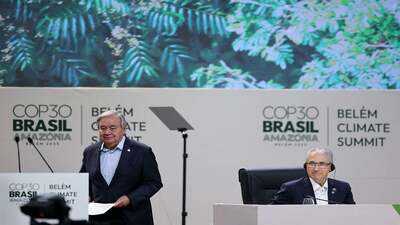New Delhi | Seven special envoys to COP30 on Friday urged leaders attending this year's UN climate conference in Brazil to deliver "decisive progress" on implementing the Paris Agreement, warning that every tenth of a degree of extra warming will bring "harsh consequences".
In a joint letter to the COP30 Presidency and world leaders, the envoys said the summit presents both a "significant opportunity and a profound challenge" and must send a strong signal that the international community stands united in its determination to confront the climate crisis.
Scheduled from November 10 to November 21, COP30 marks a decade since the Paris Agreement.
The annual climate summit is taking place amid heightened geopolitical tensions, ongoing wars and economic uncertainty triggered by US tariffs.
The United States' withdrawal from the Paris Agreement, along with several developed countries re-evaluating their climate commitments amid economic and energy security concerns, has created a challenging backdrop for this year's climate talks.
The World Meteorological Organisation on Thursday said 2025 is set to be either the second or third warmest year on record. The year 2024 was the hottest year on record and the first with a global average temperature 1.5 degrees Celsius above pre-industrial levels.
However, a permanent breach of the 1.5-degree Celsius limit specified in the Paris Agreement refers to long-term warming over a 20 or 30-year period.
Scientists on Thursday said the world will very likely reach 1.5 degrees Celsius of warming by the early 2030s.
The envoys, representing key regions including South Asia, Africa, Europe and North America, said that despite progress since the 2015 Paris Agreement, global action remains insufficient to limit temperature rise to 1.5 degrees Celsius.
"We are not on track to achieve the goals of the Paris Agreement," they wrote, adding that "every tenth of a degree of additional warming will mean harsh consequences for the world".
They called on countries to confront the "triple gap" in mitigation, adaptation and finance through accelerated efforts across the next decade.
COP30, they said, must focus on advancing the implementation of both the Paris Agreement and the UAE Consensus adopted at COP28 in Dubai.
The envoys said the COP30 Action Agenda should drive "concrete, coordinated action" that goes beyond revising Nationally Determined Contributions (NDCs) and focuses on implementing policies that help countries overperform on their existing commitments.
"Policies that deliver climate benefits can also grow economies, promote national security, improve welfare and protect the environment," they said.
On climate finance, the envoys backed the "Baku to Belem roadmap" to mobilise USD 1.3 trillion annually for developing countries and called for clear milestones and mandates to operationalise it.
Finance ministers, they said, should "create fiscal space, minimise debt burdens, and effectively mobilise domestic and international finance", especially to boost investment in the Global South.
They underlined the urgency of strengthening adaptation and resilience, warning that climate impacts have become "a major barrier to sustainable economic and social development".
They called for practical, locally relevant indicators and urged the insurance sector, central banks and private investors to help close the protection gap that threatens long-term development gains.
On energy transition, they said countries should outline roadmaps to move away from fossil fuels in line with national circumstances and simultaneously pursue plans to end deforestation and restore ecosystems.
Stressing the need for an inclusive climate regime, they said subnational and local leaders, along with civil society, must be "at the table" to reinforce national climate plans.
"COP30 is the moment to have them at the table," the letter said, urging a united global effort "to safeguard our common future".
The seven special envoys to COP30 are Adnan Z Amin (Middle East), Arunabha Ghosh (South Asia), Carlos Lopes (Africa), Jacinda Ardern (Oceania), Jonathan Pershing (North America), Laurence Tubiana (Europe), and Patricia Espinosa (Latin America and the Caribbean).
You may also like

Government will continue to support hockey, says Dr. Mandaviya as centenary celebrations of Indian hockey begin

Ghost of Yotei review - Taking forward the legacy

Vijay Deverakonda says Rashmika Mandanna's 'The Girlfriend' is going to create an impact

European Union toughens visa rules for Russians

Return to Paradise to explore Colin's backstory and reveal reason he left UK







